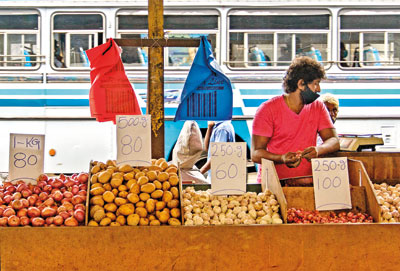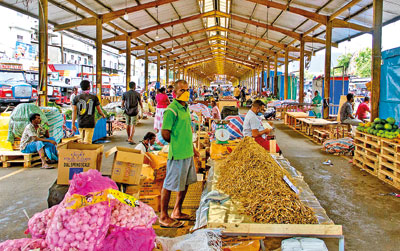News
Consumers hit hard by price hikes amidst pay cuts, job losses

Local market bracing for further price increases with fluctuations expected in the India market badly hit by COVID-19. Pix by Sameera Weerasekera
Food and other essential items have skyrocketed in price amidst falling income–and one reason, vendors say, is the Special Commodity Levy (SCL) the Government introduced in May.
Consumers uniformly complained of high prices which have hit them hard at a time when the pandemic has caused pay cuts and job losses.
Organisation members were reporting a sharp and sudden hike in prices, said Deanna Rizwi, Sri Lanka Housewives’ Association (SLHA) President. The items include sugar, milk, vegetables and even poultry.
These increases were not just a rupee or two, said SLHA Joint Secretary Nadira Raban. They were in excess of Rs 30. “The income of most households has dropped by fifty percent while many are in constant fear of redundancy and job loss,” she pointed out. “The situation is pathetic. Even dhal and rice are expensive.”
The sudden shift was largely owing to the SCL on at least 26 varieties of items being increased for six months from May 21, said Chaminda Vidanagamage, General Secretary of the Colombo Business Association (CBA). Affected products include yogurt, big onions, garlic, dhal, margarine, canned fish, sugar, and fruits.
 The tax may have been imposed on imports to encourage local production, Mr Vidanagamage observed. But, at the supplier end, the Sri Lankan market is not yet ready to take advantage of such protectionism. The resulting vacuum will naturally cause a surge in prices which the consumer has to bear the brunt of.
The tax may have been imposed on imports to encourage local production, Mr Vidanagamage observed. But, at the supplier end, the Sri Lankan market is not yet ready to take advantage of such protectionism. The resulting vacuum will naturally cause a surge in prices which the consumer has to bear the brunt of.
“It will take Sri Lankan farmers around six months to meet local demand,” he continued. “Where are the stocks? The Government must show us. The annual yields and farms of some crops have seen consistent reductions.”
The depreciation of the rupee against the dollar is another reason for high prices, the CBA said. Importers who bought their goods before the pandemic–or even during it–will have paid the higher rates. The shipments that were incoming now were, therefore, purchased at higher dollar rates than prevailing market values.
Meanwhile, buyers were now functioning according to the ‘delivery-on-payment’ system. This affected an importer’s negotiating powers because suppliers were less likely to offer discounts when payments are done after delivery.
The Sri Lankan market is also bracing for further fluctuations in the India market where it gets many supplies from. The neighbouring country is severely affected by COVID-19 and the CBA predicted that the effect will be felt here within the next six months.
Opportunistic businesses were preying on the crisis and the public’s helplessness, Mr Vidanagamage said. Prices for isopropyl alcohol, the main ingredient in hand sanitiser, has risen exorbitantly. It is even being sold now on the black market.
“The Consumer Affairs Authority (CAA) and others have had to intervene in matters such as these because it is the consumer, who is already badly affected, that has to bear the weight,” he said.
There must be a working committee formed comprising industry representatives and Government agencies to avoid time lags in decision-making and market implementation. “Sometimes, once a decision is taken, the market situation has already changed,” Mr Vidanagamage pointed out. “We need a faster mechanism to gather information, weigh it and decide what to do.”
The agricultural sector also has to be significantly strengthened if Government’s efforts to reduce imports are to have the intended impact. The surge in prices was a result of policy and not COVID-19, the CBA said.
But the Essential Food Commodities Importers and Traders Association (EFCITA) tied the price rise to the pandemic. “Businesses are trying to earn two to three months’ worth of revenue that they missed out on,” said V Illamanathan, Secretary. “Fluctuations in the dollar rates caused by the pandemic are definitely a factor. The prices of goods, however, are better than what they are in neighbouring countries.”

